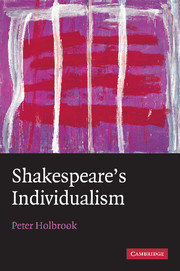Book contents
- Frontmatter
- Contents
- Acknowledgements
- Introduction
- PART I SHAKESPEARE, HAMLET, SELFHOOD
- 1 Hamlet and failure
- 2 ‘A room … at the back of the shop’
- 3 Egyptianism (our fascist future)
- 4 ‘Become who you are!’
- 5 Hamlet and self-love
- 6 ‘To thine own self be true’
- 7 Listening to ghosts
- 8 Shakespeare's self
- PART II SHAKESPEARE AND EVIL
- PART III SHAKESPEARE AND SELF-GOVERNMENT
- Conclusion: Shakespeare's ‘beauteous freedom’
- Index
- References
5 - Hamlet and self-love
Published online by Cambridge University Press: 06 July 2010
- Frontmatter
- Contents
- Acknowledgements
- Introduction
- PART I SHAKESPEARE, HAMLET, SELFHOOD
- 1 Hamlet and failure
- 2 ‘A room … at the back of the shop’
- 3 Egyptianism (our fascist future)
- 4 ‘Become who you are!’
- 5 Hamlet and self-love
- 6 ‘To thine own self be true’
- 7 Listening to ghosts
- 8 Shakespeare's self
- PART II SHAKESPEARE AND EVIL
- PART III SHAKESPEARE AND SELF-GOVERNMENT
- Conclusion: Shakespeare's ‘beauteous freedom’
- Index
- References
Summary
Self-love, my liege, is not so vile a sin
As self-neglecting.
Henry V, II.iv.74–5.In self-trust, all the virtues are comprehended.
Emerson, ‘The American Scholar’ (1849), Emerson, ed. Poirier, 47.The central problem, then, is the traditional one – Hamlet's delay. On this issue Nietzsche, and the tradition of life philosophy he inaugurates, is essential. Like other nineteenth-century thinkers – Emerson, Mill, Marx, Wilde – Nietzsche was profoundly committed to the ideal of self-realization. Zarathustra is exceptional among prophets because he does not want imitators: ‘I am a law only for my kind, I am no law for all’, he insists. There is a comparison to be made here with Montaigne, who does not set himself up as any sort of teacher: ‘I have not, nor do I desire, enough authority to be believed’; the Essays are offered as ‘my humours, my opinions: I give them as things which I believe, not as things to be believed’ (167; I.26). Like Emerson (‘The imitator dooms himself to hopeless mediocrity’), Zarathustra exhorts his listeners to embark upon the one truly necessary project in life. This project is simply: ‘Become who you are!’ Universal ideals – or, as he preferred to call them, idols – appalled Nietzsche. In worshipping such demons, Nietzsche felt, individuals sacrificed their creative powers, erroneously assuming that they had to live according to a universal code (when all any law contained was merely the creative genius of the person who long ago devised it).
- Type
- Chapter
- Information
- Shakespeare's Individualism , pp. 73 - 77Publisher: Cambridge University PressPrint publication year: 2010



